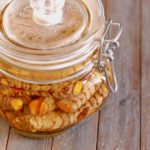Fermented Turmeric Recipe
Ferment turmeric if you want therapeutic benefits that curcumin has to offer. Fermented turmeric compared to regular turmeric is better absorbed and utilized in the body, translating to better health effects. Eat it with black pepper to increase it's action by 2000%.
Equipment
- 3/4 L Airlock Fermenter or Fido jar
Ingredients
- 250 grams fresh organic turmeric root
- 500 mL non-chlorinated water there will be leftover brine
- 10 grams non-iodized sea salt
Instructions
- Make a 2% brine with water and salt. Set aside to cool.
- Gently wash each root in filtered water (a clean tooth brush helps wash around the knobes). Trim the ends and any scabs where exposed root has healed (this is often where mould grows). Slice each root lengthwise, keeping one end connected.
- Transfer turmeric to a clean 3/4 L Airlock Fermenter, below the shoulder of the jar. Put a glass weight over top.
- Once the brine is lukewarm, pour into the jar, just below the base of the neck (there should be some brine left over). This should leave 1/2-inch headspace and generously submerge the turmeric.
- Fill the 3-peice airlock with water to the fill line. Insert through the lid; fit lid on the jar and clamp shut.
- Ferment at 18-22ºC for 7 days on the counter away from direct sunlight or with a dark towel wrapped around the jar. Careful not to obstruct the airlock.
- Eat now or transfer to the fridge or cold storage for at least 3 more weeks. The ferment will keep unopened in cold storage for 6-9 months as long as the airlock remains full. Once opened replace the airlock with the plug. Store in the fridge. Grate fermented turmeric on a microplane and add to curries, smoothies, marinades for meat, salad dressings, stir-fries, pumpkin loaf, or, simply, hot water or milk for tea.
Notes
Fermentation jars should be 3/4 filled with vegetables for a proper vegetable to brine ratio. Less than this may short the microbes of nutrients they need for fermentation.
